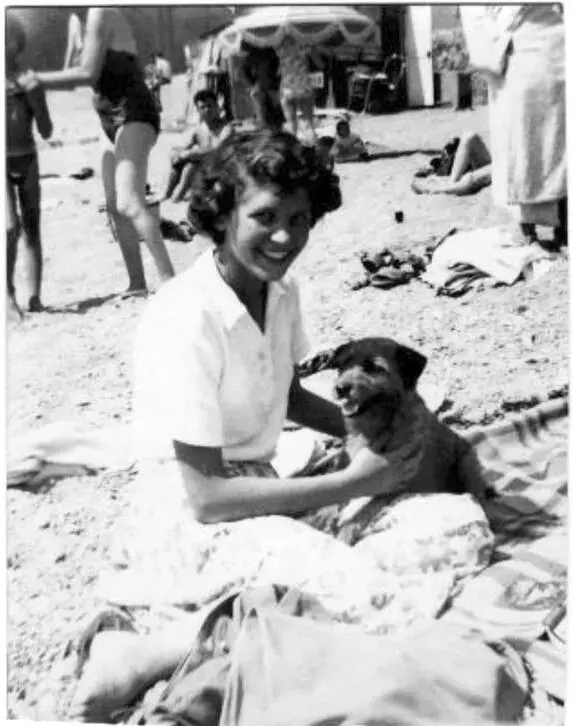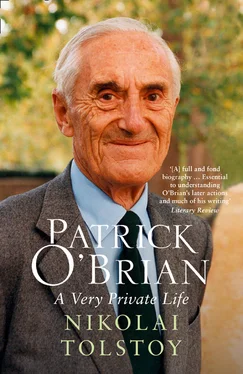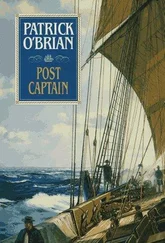A poem written in the same notebook suggests the black despair which at times gripped him:
Sink: down in the grey sea
slowly down. The layers
silent, of depression. Down.
Through them.
No irritation, anger left
no hint of red
all grey dull and silence welling
up past your ears.
You sink your head
Down. Breathing slow
Down. Eyes unfocussed
One tear creeps down the bent
ash dying face.
As in North Wales during the summer of 1949, the prospect of death returned to haunt Patrick. At the end of April 1951, ‘P. said after yesterday’s tennis he gets partial black-outs while playing, which connect with feeling of other-worldness – of playing at being alive: a game which might be stopped at any moment.’
On 20 October he ‘wrote his death dream’, and about that time composed this grim verse, entitled ‘You will come to it’:
Do not suppose their motions pantomime
Because the thing they dig is dark, unseen
The mattock and the shovel swing in time
A near approach will show you what they mean.
On 11 May 1951 my mother, more buoyant by nature, experienced a remarkable vision:
A Dream: I died, & arrived on a shore that struck me as being like Lundy, from across a big grey sea. I worried about P coming, & he arrived soon after.[fn6] Was filled with immense feeling of relief because of two things: permanence in this existence, & continuence of free will // I am not aware of ever having felt unhappiness from the impermanence of this life, nor of regretting the loss of free will in the usual pre-conceived notion of Heaven. Have worked backwards & am now fully aware of both, though much comforted by the exceedingly vivid dream. The dream had no sequence of events, but was like a state of being. (That life there would go on for ever). (In the manner of owning a house instead of renting it).
Lundy is the island in the Bristol Channel where my mother spent many happy holidays when living as a girl in North Devon. What I am sure she did not know, is that it was regarded by the pagan Celts as a location of the Otherworld, where the souls of the dead are received.[fn7]
The couple endured this extreme poverty for well over two years. It was on 2 May 1952 that their affairs suddenly altered dramatically for the better. Publication of Three Bear Witness had proved a material disappointment, both in reviews and sales. But good news was on the way.
‘I was scrubbing the black hole floor’, wrote my mother,
when P. came in almost breathless saying ‘Such news, M’. It was S.C.B.’s [Spencer Curtis Brown] letter to say Harcourt, Brace want TBW [to be called Questions & Answers over there] for 750 dollars. Quite knocked up, both of us … For the first time on such an occasion we are not wild: no rushings out & spendings, nor the desire to do so. Could eat but little lunch, anyway … We walked to P. Vendres after tea, feeling upset & disturbed with our wealth. Saw wirelesses, but spent nothing.
Six days later Curtis Brown sent news almost as exciting. The American advance was to be sent direct to France, which, with a modicum of discretion, meant they need not pay the penal British income tax! ‘We are so happy & settled in our economy that this wealth worries us,’ exclaimed my mother. Charming prospects opened up on every side. ‘We plan a 3000 mile round trip of Spain & Portugal’; ‘Take many turns around Collioure in a day, to look at cars.’ As concerns the latter, it is fortunate that they were not able to anticipate just how premonitory was to prove a sight glimpsed by my mother, given their alarming proclivity for experiencing traffic crashes: ‘On way home [from the dentist in Elne] saw vast car turned on its side in ditch, eh?’ Patrick did not as yet possess a driving licence, being content for the present for my mother to take the wheel.
Excited plans began for purchase of a car, while Patrick further contemplated buying a sailing boat which was for sale in the harbour. The latter disappointingly turned out to be in too poor condition to be worth even the modest 8,000 francs demanded, but a car they had to have. The noisy and crowded little streets of Collioure appeared ever more unbearably claustrophobic, and they longed for means of occasional escape. Friends in England offered them their Opel for £100, an offer so enticing that my mother travelled to London in July to bring it back, but from the moment she arrived, everything began to go wrong. Additional expenses mounted by the hour: garage bill, ferry fare, tax, French import duty … my poor mother was in despair: ‘I think my heart is breaking & I never want to see the Opel again, and how I love P. and am utterly lonely.’
Eventually the Bank of England prohibited the Opel’s export, and the same afternoon another car rammed the wretched car, breaking an indicator and smashing a window.
Altogether my mother totted up that she had spent a precious £35 on this fruitless errand, and her despair was only alleviated when her father, with whom she stayed in Chelsea, gave her £20. Battered and exhausted, she returned to Collioure, accompanied by Patrick’s son Richard, who was now to spend his first summer holiday with them, camping in Andorra. After his eventual return to England my mother noted despairingly: ‘Street noises formid able’, and a week later she and Patrick returned by bus to Andorra in the hope of completing a house purchase they had planned during their visit to that country. In the event a pied-à-terre was sadly to prove beyond their means.
Life looked up in the latter part of the year, but even in their days of direst poverty they rarely allowed themselves to feel downcast for very long, no matter how heavily the dice appeared loaded against them. They swam, walked, sunbathed on the plage St Vincent, and when they could afford it played tennis on the baking-hot hard court in the moat of the Château Royal. The plage in particular provided an ever-present refuge from their claustrophobic little apartement , although it had its own occasional hazards – noisy tourists, rowdy children, and (for Patrick that June): ‘A disagreeable day … A gull shat all over me, the rug and Thos. Mann.’

Odette and Buddug on the plage St Vincent
Odette Boutet (then Bernardi) recalls an occasion when my mother and she swam the traversée across the harbour, from La Balette on the south side of the bay to the plage St Vincent opposite. It being the first swim of the season, and the water icy, on emerging they found they lacked strength for the return swim. Accordingly they walked back past the town and Port d’Avall in their bathing costumes. It was an unusual sight in those days, and the contrasted attractions of the two brown-limbed young women – Odette dark-haired and olive-skinned, and my mother fair-haired and blue-eyed – drew much attention from the (chiefly male, I assume) inhabitants along the way.
In the evenings they read, played chess, or engaged in an improvised form of bridge for two. Although an enthusiast for both games, Patrick was (like Stephen Maturin) but a middling achiever at such pastimes, who more often than not found himself beaten by my mother. Once, after a particularly hard-fought contest, Patrick wrote defiantly on the score-sheet: ‘Bridge, a silly game. BY ORDER P. O’BRIAN. SEPT 1951’.
Ever adventurous, from time to time they escaped the town to explore the mountains. Their close friend Odette, who was quite as audacious, frequently accompanied them. In June 1951 the three of them (five, including Buddug and Odette’s dog Rubill) travelled on foot to the forest behind the Tour Massane, where they camped beside the wood. That night boars could be heard grunting close by. Peering from their tents at the moonlit glade, they were alarmed to discover a large female boar leading her offspring, and quickly clasped the dogs’ muzzles to prevent their alerting the irascible parent. The expedition was voted a great success on their return, despite Odette’s temporarily losing her voice from exhaustion.
Читать дальше













